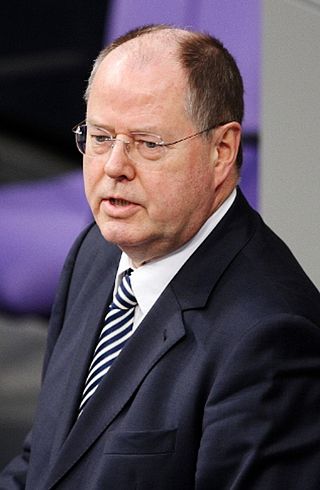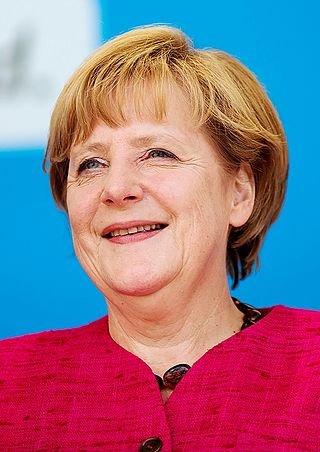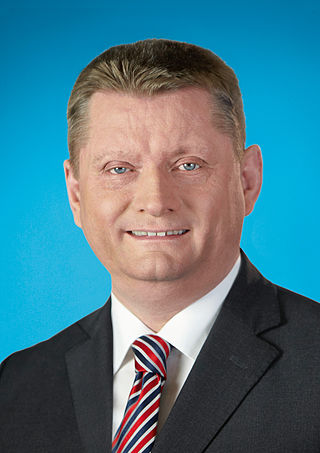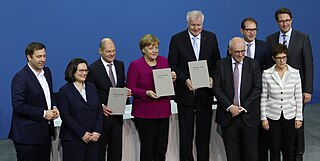The 2018 German government crisis, [11] sometimes referred to as Asylstreit (asylum quarrel), was a government crisis affecting the Fourth Merkel cabinet, [1] which began on 18 June 2018 and effectively ended on 4 July 2018. [12]
Before the formation of a coalition government in March 2018, immigration policy had become an issue that prevented Angela Merkel obtaining a workable majority, with the Free Democratic Party declining to join a coalition and all potential coalition partners calling for stricter migration controls. [13]
The coalition government agreement, made between Christian Democratic Union (CDU), its Bavarian sister party the Christian Social Union (CSU), and the Social Democratic Party (SPD), was not ratified by SPD members until 3 March 2018, more than five months after the September 2017 German Federal elections. [14] The coalition agreement indicates that the parties intended to modify policies in relation to refugees and family reunification. "The previous government (also a CDU/CSU/SPD grand coalition) had suspended the right of refugees with a 'limited protection status' to bring their families over. The new coalition deal says this will be limited to 1,000 people per month. On top of that, the number of asylum-seekers taken in altogether is to be capped at between 180,000 and 220,000 per year." [15]
In June 2018, the coalition government, especially the CDU/CSU sister parties, quarreled over the specifics of asylum policies. After the interior minister Horst Seehofer (CSU) had announced a "master plan" on asylum policies containing 63 points [16] - of which 62 were reportedly agreed between Seehofer and chancellor Angela Merkel (CDU) [1] - differences arose on the question of the rejection of asylum seekers already registered in other EU countries. After Seehofer threatened "national measures", meaning the closure of the borders for such asylum seekers, Merkel requested two weeks for talks on a "European solution" and convened an EU asylum policy summit on migration policies in the night of 28/29 June. [17] [18] The result of the summit was seen as a "vague" success for Merkel. The Visegrád Group, represented by the Hungarian prime minister, claimed that the EU was beginning to accept its proposals for dealing with asylum seekers. [19] [20]
Among other things, it was agreed that European governments are allowed to "take all necessary internal legislative and administrative measures" to prevent refugees and migrants from crossing Europe's internal borders. The Guardian called this "an apparent lifeline for Merkel". [21] While Merkel claimed that she had reached agreements with Greece and Spain as well as commitments of 14 states on deportations of registered migrants, the Visegrád Group among them, [22] the governments of the Czech Republic, Hungary, and Poland subsequently denied that there were new agreements. [23]
It was also reported that there were personal differences between Merkel and Seehofer, the latter reportedly saying: "I can’t work with this woman any more!" [18]
After the EU summit, German chancellor Angela Merkel faced resistance by the Bavarian CSU party over the result of the summit, and interior minister Horst Seehofer announced a "declaration" Sunday 1 July. Seehofer threatened to order "national measures" and reject migrants who are registered in other EU countries. It was reported that he considered talks with Merkel in Berlin on 30 June 2018 on the summit results as "ineffective" and "useless", stating that Merkel's plan would create new "pull factors" for asylum seekers to come to Europe. [3] He also rejected a proposal by Merkel to accommodate asylum seekers who are already registered in EU countries in so-called "anchor centers" (Ankerzentren), which would allow quicker deportations. [24]
Whilst Bavarian minister president Markus Söder stated that the summit result would point "in the right direction", the party leaders held a meeting in the CSU party headquarters in Munich on Sunday and voiced criticism of Merkel's plan. [2] Merkel stated that she wants to avoid a breakup of the government and the historical parliamentary group with the Bavarian sister party. [25]
On the evening of 1 July, interior minister Horst Seehofer reportedly offered the CSU party leadership his resignation over the conflict with Angela Merkel, [26] but chose to stay in office for the time being, after party board members as Alexander Dobrindt convinced him to stay. [27] New talks were agreed between CDU and CSU delegations for 1700 CET on 2 July in Berlin. Seehofer stated ahead of the talks: "I'm not going to get dismissed by a chancellor who's only chancellor because of me." [28] [29]
Later in the evening of 2 July, an agreement was made between the CDU/CSU sister parties. It contains the introduction of Transitzentren (transit centres) which allow quick deportations of asylum seekers already registered abroad without entering the country, and in specific cases the rejection of such people directly at the German border. To avoid that there is only a national approach, agreements with the European neighbours are also included. Seehofer announced that the agreement allows him to stay in office as Minister of the Interior. After the agreement between the sister parties, talks with the coalition partner SPD followed. Leading SPD politicians said that they had "many questions" about the agreement. [30]
By 9 July, it was being reported that the ruling coalition had achieved a level of stability, leaving the government able to negotiate bilateral deals with other European countries. Meanwhile, talks commenced with Austria and Italy in an effort to close the Mediterranean migration routes from Africa to Europe. [31]

The Christian Social Union in Bavaria is a Christian democratic and conservative political party in Germany. Having a regionalist identity, the CSU operates only in Bavaria while its larger counterpart, the Christian Democratic Union (CDU), operates in the other fifteen states of Germany. It differs from the CDU by being somewhat more conservative in social matters, following Catholic social teaching. The CSU is considered the de facto successor of the Weimar-era Catholic Bavarian People's Party.

Germany is a democratic and federal parliamentary republic, where federal legislative power is vested in the Bundestag and the Bundesrat.

Angela Dorothea Merkel is a German retired politician who served as Chancellor of Germany from 2005 to 2021. She is the only woman to have held the office. She previously served as Leader of the Opposition from 2002 to 2005 and as Leader of the Christian Democratic Union from 2000 to 2018. During her chancellorship, Merkel was frequently referred to as the de facto leader of the European Union (EU) and the most powerful woman in the world.

Federal elections were held in Germany on 18 September 2005 to elect the members of the 16th Bundestag. The snap election was called after the government's defeat in the North Rhine-Westphalia state election, which caused them to intentionally lose a motion of confidence to trigger an early federal election. The outgoing government was a coalition of the centre-left Social Democratic Party of Germany (SPD) and Alliance 90/The Greens, led by federal Chancellor Gerhard Schröder. The election was originally intended for the autumn of 2006.

Peer Steinbrück is a German politician who was the Chancellor-candidate of the Social Democratic Party (SPD) in the 2013 federal election. Steinbrück served as the eighth Minister-President of North Rhine-Westphalia from 2002 to 2005, a member of the Bundestag from 2009 to 2016, and as Federal Minister of Finance in the first Cabinet of Chancellor Angela Merkel from 2005 to 2009.

Horst Lorenz Seehofer is a German politician who served as Minister for the Interior, Building and Community under Chancellor Angela Merkel from 2018 to 2021. A member of the Christian Social Union (CSU), he served as the 18th minister-president of Bavaria from 2008 to 2018 and Leader of the Christian Social Union in Bavaria from 2008 to 2019.

CDU/CSU, unofficially the Union parties or the Union, is a centre-right Christian democratic and conservative political alliance of two political parties in Germany: the Christian Democratic Union of Germany (CDU) and the Christian Social Union in Bavaria (CSU).

Federal elections were held on 22 September to elect the members of the 18th Bundestag of Germany. At stake were all 598 seats to the Bundestag, plus 33 overhang seats determined thereafter. The Christian Democratic Union of Germany/Christian Social Union of Bavaria (CDU/CSU) of incumbent chancellor Angela Merkel won their best result since 1990 with nearly 42% of the vote and nearly 50% of the seats, just five short for an overall majority. The Free Democratic Party (FDP) failed to meet the 5% vote electoral threshold in what was their worst showing ever in a federal election, denying them seats in the Bundestag for the first time in their history.

Peter Altmaier is a German politician of the Christian Democratic Union (CDU) who served as Acting Minister of Finance from 2017 to 2018 and as Federal Minister for Economic Affairs and Energy from 2018 to 2021. He previously served as Federal Minister for the Environment, Nature Conservation and Nuclear Safety from May 2012 to December 2013 and Head of the German Chancellery and as Federal Minister for Special Affairs from December 2013 to March 2018. Altmaier is widely seen as one of Chancellor Angela Merkel's most trusted advisors and advocates for her more centrist wing of the CDU. He is known for his "compromising style" and was described in 2017 as "the most powerful man in Berlin".

The history of Germany from 1990 to the present spans the period following German reunification, when West Germany and East Germany were reunited after being divided during the Cold War. Germany after 1990 is referred to by historians as the Berlin Republic. This time period is also determined by the ongoing process of the "inner reunification" of the formerly divided country.

Gerda Hasselfeldt is a German politician of the Christian Social Union (CSU) who served as deputy chairperson of the CDU/CSU parliamentary group and chairwoman of the Bundestag group of CSU parliamentarians. Following her departure from active politics, she became President of the German Red Cross in 2018.

Jens Georg Spahn is a German politician who served as Federal Minister of Health in the fourth cabinet of Chancellor Angela Merkel from 2018 to 2021. A member of the centre-right Christian Democratic Union (CDU), he has been the member of the lower house of the federal parliament, the Bundestag, for Steinfurt I – Borken I since 2002.

Federal elections were held in Germany on 24 September 2017 to elect the members of the 19th Bundestag. At stake were at least 598 seats in the Bundestag, as well as 111 overhang and leveling seats determined thereafter.

Gottfried Hermann Gröhe is a German lawyer and politician of the Christian Democratic Union (CDU) who served as Minister of Health in the third cabinet of Chancellor Angela Merkel from 2013 until 2018.

Markus Thomas Theodor Söder is a German politician serving as Minister-President of Bavaria since 2018 and leader of the Christian Social Union in Bavaria (CSU) since 2019.

Stephan Ernst Johann Mayer is a German lawyer and politician of the Christian Social Union (CSU) who has been a member of the German Bundestag since 2002. In 2022, he briefly served as the Secretary General of the CSU, under the leadership of the party's chairman Markus Söder.

Federal elections were held in Germany on 26 September 2021 to elect the members of the 20th Bundestag. State elections in Berlin and Mecklenburg-Vorpommern were also held. Incumbent chancellor Angela Merkel, first elected in 2005, chose not to run again, marking the first time that an incumbent Chancellor of the Federal Republic of Germany did not seek re-election.

The Fourth Merkel cabinet was the 23rd Government of the Federal Republic of Germany during the 19th legislative session of the Bundestag. It was sworn in on 14 March 2018 following the 2017 federal election and dismissed on 26 October 2021, acting in a caretaker mode until 8 December 2021. It was preceded by the third Merkel cabinet and succeeded by the Scholz cabinet. Led by Chancellor Angela Merkel, it was the third cabinet under Merkel to be supported by a coalition of the Christian Democratic Union (CDU), the Christian Social Union of Bavaria (CSU), and the Social Democratic Party (SPD).

The 2018 Hessian state election was held on 28 October 2018 to elect the members of the Landtag of Hesse. The outgoing government was a coalition of the Christian Democratic Union (CDU) and The Greens led by Minister-President Volker Bouffier.

Sabine Katharina Weiss is a German lawyer and politician of the Christian Democratic Union (CDU) who has been serving as a member of the Bundestag from the state of North Rhine-Westphalia since 2009.